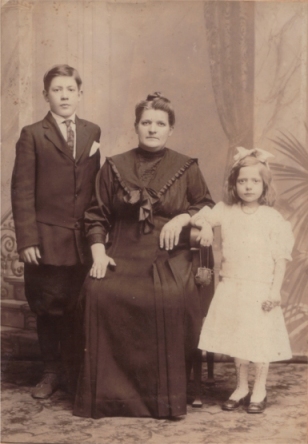Genea-Musings’ latest Saturday Night Genealogy Fun (SNGF) made me aware of a genealogy challenge (or prompt) called Fearless Females by Lisa Alzo, author of The Accidental Genealogist blog. According to Alzo’s site the challenge is focused on “celebrating and honoring ‘fearless females’ in our family trees” to mark National Women’s History Month, which is the month of March, with a post responding to unique prompts for each day of the month. Although this challenge has already started, I think this is a really important one to participate in, particularly since I would not have gotten very far in researching my own family history if it were not for the women in my family tree that kept all of the information, stories, and photographs.
Prompt for March 1 — Do you have a favorite female ancestor? One you are drawn to or want to learn more about? Write down some key facts you have already learned or what you would like to learn and outline your goals and potential sources you plan to check.
I had to think about this one very hard, because it is so very difficult to decide among your own ancestors which one is your favorite. Additionally, there are several which I would like to learn more about. One in particular is my 2nd great grandmother, Roza Mari (Peto) Sebok (1871-1937), pictured in the following photograph with her son (and my great grandfather), Albert, and her daughter, Emma.

I do know some things about Roza, but not nearly enough. I know she was born February 2, 1871 in Hungary. Family oral history states that she was born in the same Hungarian village as her son, which was the village of Székelyzsombor, (now Jimbor, Romania). I know that she died June 15, 1937 in San Bernardino Co., California. Although I have not been able to find an exact date, she married Frank Sebok (1875-1951) at some point prior to 1903, possibly in 1901 or 1902—Frank Sebok states on the 1930 U.S. Federal Census that he was about 26 when he was first married to Roza, which puts their marriage date in either 1901 or 1902. I also know that Roza and her son, Albert, left Hungary to join Frank in America in 1905 aboard the Carpathia, arriving in New York on November 20, 1905; and that they joined Frank in East Chicago, Indiana, where the family lived until they relocated to San Bernardino Co., California.
What I don’t know are the details of Roza’s life before her arrival in America. According to oral history, Roza had been married before she married Frank. According to the story, she had a son from this first marriage and her husband died, possibly in military service of some kind. Because the family of her first husband was well-off (they were said to have had a large home, and possibly a minor noble or military title) the child remained in their custody. To date I have not been able to verify the story or find out the identity of her first son. According to living relatives at some point just before the Communists took over, the son sent a letter to Roza letting them know that he and his family were alright and that they were fleeing the country, as the new government was seizing their home. Unfortunately, the letter appears to have ended up in the possession of one of Roza’s daughter’s children and its whereabouts is unclear, if it wasn’t lost years ago.
The dead ends aside, I have often wondered what it must have been like for Roza to leave a child in Hungary never to see him again. I can only image how difficult that was for her.

Whew, what a story! It’s hard to imagine how difficult it must have been for Roza to leave a child in Hungary. People faced so many hardships when they emigrated to America.